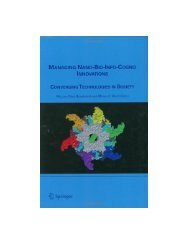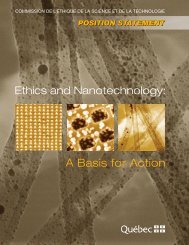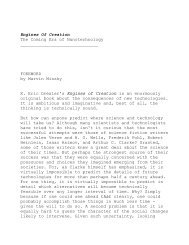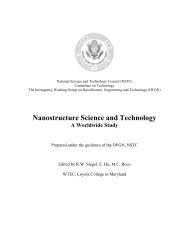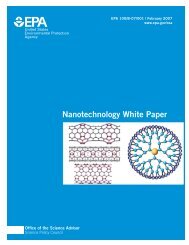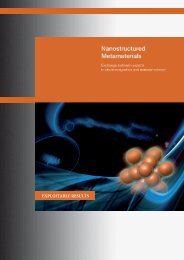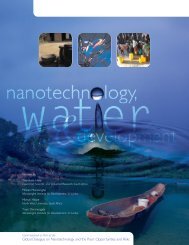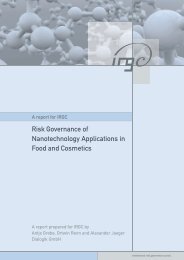Download - Nanowerk
Download - Nanowerk
Download - Nanowerk
Create successful ePaper yourself
Turn your PDF publications into a flip-book with our unique Google optimized e-Paper software.
technologies have been commented on. Peace movements such as Pax Christi<br />
International focus more on human rights, mediation and reconciliation in conflicts.<br />
Technological aspects are addressed in their advocacy work on disarmament and arms<br />
control. Such peace movements tend to focus on military technologies including Weapons<br />
of Mass Destruction, conventional weapons (cluster ammunition, small arms, etc.) and<br />
sometimes non-lethal weapons. 32<br />
The UK based NGO, Privacy International, has issued a map of leading surveillance<br />
societies in the EU and around the world. According to it, Germany is the best of the<br />
European countries, offering significant protection and safeguards for the privacy of its<br />
citizens. Belgium, Austria and Greece offer adequate safeguards against abuse. Some<br />
safeguards but weakened protection is offered by Portugal, France, Italy, Cyprus,<br />
Hungary, Poland, Latvia, Estonia and Finland. Ireland, Spain, the Netherlands, Denmark,<br />
Czech Republic, Slovenia, Lithuania and Sweden systematically fail to uphold safeguards.<br />
The UK is one of five global, endemic surveillance societies, offering the worst protection<br />
(Privacy International, 2006). Privacy International has included nanotechnology as a<br />
potential future concern for privacy in its annual reports in 2004 and 2005 (PHR 2004,<br />
PHR 2005).<br />
5.5 Key societal and ethical issues<br />
Key societal and ethical issues related to security technologies and to nanotechnologies<br />
have been identified from several sources. These are discussed below.<br />
The European Security Research Advisory Board (ESRAB) has developed a strategic<br />
research agenda for European security research, including technical and non-technical<br />
aspects (ESRAB, 2006). ESRAB highlights the need for regulating governance, including<br />
national authorities and improving EU regulations on classified information. The<br />
programme’s guiding principle is respect for privacy and civil liberties. This is of course a<br />
requirement for all EU funded research. The research agenda aims to integrate research<br />
and technology development with research into political, social and human sciences in<br />
five areas:<br />
• citizens and security;<br />
• understanding organizational structures and cultures of public users;<br />
• foresight scenarios and security as an evolving concept;<br />
• economics of security;<br />
• ethics and justice.<br />
The programme furthermore includes innovation support measures. Not all political,<br />
social and human research is relevant to nanotechnology applied to security. Most are<br />
more closely related to the implications of security policy for civil rights, and are targeted<br />
to policy issues. The recommended research topics ‘ethical aspects of security<br />
technologies’ and a ‘review of existing codes of conduct, best practices, etc. as to the<br />
ethical use of security technologies and to develop new ones where shortfalls exist’ are<br />
relevant to security applications of nanotechnology (ESRAB, 2006, p 60).<br />
As part of the review of codes of conduct etc proposed by ESRAB, there is a pressing<br />
need to develop new European regulations for handling classified information in EU<br />
funded projects. These new regulations should include “clarification on the dual use of<br />
nano-derived technological devices for security purposes and full respect of human<br />
dignity and integrity” (Morrison, 2007). Furthermore, the concept of ‘security technology’<br />
should be limited as much as possible, to avoid unnecessary restrictions to academic and<br />
trade freedom.<br />
32 www.paxchristi.net<br />
55




